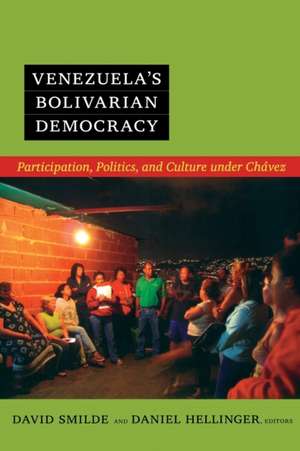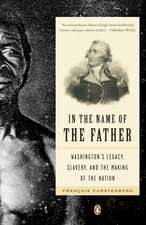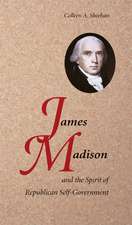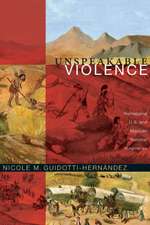Venezuela`s Bolivarian Democracy – Participation, Politics, and Culture under Chávez
Autor David Smilde, Daniel Hellingeren Limba Engleză Paperback – 4 aug 2011
Preț: 305.08 lei
Nou
Puncte Express: 458
Preț estimativ în valută:
58.38€ • 61.11$ • 48.30£
58.38€ • 61.11$ • 48.30£
Carte tipărită la comandă
Livrare economică 07-21 aprilie
Preluare comenzi: 021 569.72.76
Specificații
ISBN-13: 9780822350415
ISBN-10: 0822350416
Pagini: 408
Ilustrații: 12 photos, 1 map, 13 tables, 8 figures
Dimensiuni: 156 x 235 x 15 mm
Greutate: 0.59 kg
Editura: MD – Duke University Press
ISBN-10: 0822350416
Pagini: 408
Ilustrații: 12 photos, 1 map, 13 tables, 8 figures
Dimensiuni: 156 x 235 x 15 mm
Greutate: 0.59 kg
Editura: MD – Duke University Press
Cuprins
Foreword: Venezuelas Bolivarian Democracy / Julia Buxton; Introduction: Participation, Politics, and Culture--Emerging Fragments of Venezuelas Bolivarian Democracy / David Smilde; 1: Defying the Iron Law of Oligarchy I: How Does El Pueblo Conceive of Democracy? / Daniel Hellinger; 2: Participatory Democracy in Venezuela: Origins, Ideas, and Implementation / Margarita López Maya and Luis E. Lander; 3: Urban Land Committees: Co-optation, Autonomy, and Protagonism / María Pilar García-Guadilla; 4: Catia Sees You: Community Television, Clientelism, and the State in the Chávez Era / Naomi Schiller; 5: Radio Bemba in an Age of Electronic Media: The Dynamics of Popular Communication in Chávezs Venezuela / Sujatha Fernandes; 6: We Are Still Rebels: The Challenge of Popular History in Bolivarian Venezuela / Alejandro Velasco; 7: The Misiones of the Chávez Government / Kirk A. Hawkins, Guillermo Rosas, and Michael E. Johnson; 8: Defying the Iron Law of Oligarchy II: Debating Democracy Online in Venezuela / Daniel Hellinger; 9: Venezuelas Telenovela: Polarization and Political Discourse in Cosita Rica / Carolina Acosta-Alzuru; 10: The Color of Mobs: Racial Politics, Ethnopopulism, and Representation in the Chávez Era / Luis Duno Gottberg; 11: Taking Possession of Public Discourse: Women and the Practice of Political Poetry in Venezuela / Elizabeth Gackstetter Nichols; 12: Christianity and Politics in Venezuelas Bolivarian Democracy: Catholics, Evangelicals, and Political Polarization / David Smilde and Coraly Pagan; Afterword: Chavismo and Venezuelan Democracy in a New Decade / Daniel HellingerReferences; Index
Recenzii
"Focusing on the everyday experience of Venezuelans, the contributors examine what they see as outlets for ongoing emocratic participation in Venezuela, including cultural activities, blogs, community media and more. While the Chávez regime has its failings, they say, new political spaces and networks continue to emerge. - Survival, June-July 2012
Venezuelas Bolivarian Democracy makes it clear that, while transforming the political landscape, the Chávez era also embodies important continuities with the countrys recent past. The serious problems the country faces and social movements that support Chávez did not emerge overnight; they are rooted in the inequities of the oil economy that took hold during the twentieth-century. This book is a must-read for anybody trying to make sense of the ongoing process of change that is remaking Venezuela. Miguel Tinker Salas, author of The Enduring Legacy: Oil, Culture, and Society in Venezuela
This book evaluates Hugo Chávez Venezuela with a clear eye. Through nuanced attention to new empirical research in a rapidly changing context--who speaks, what people believe, who decides, and how power works--it offers a framework for analyzing the intertwined democratic and non-democratic aspects of politics as it is practiced and lived. This multi-sited approach--looking from neighborhoods to media, activists to government institutions--could be applied with equal success to the post-revolutionary regimes of Cardenas or Castro, the populist governments of Vargas or Peron, and the liberal democracies of the present. Jeffrey W. Rubin, Boston University
"Focusing on the everyday experience of Venezuelans, the contributors examine what they see as outlets for ongoing emocratic participation in Venezuela, including cultural activities, blogs, community media and more. While the Chavez regime has its failings, they say, new political spaces and networks continue to emerge." - Survival, June-July 2012 "Venezuela's Bolivarian Democracy makes it clear that, while transforming the political landscape, the Chavez era also embodies important continuities with the country's recent past. The serious problems the country faces and social movements that support Chavez did not emerge overnight; they are rooted in the inequities of the oil economy that took hold during the twentieth-century. This book is a must-read for anybody trying to make sense of the ongoing process of change that is remaking Venezuela." Miguel Tinker Salas, author of The Enduring Legacy: Oil, Culture, and Society in Venezuela "This book evaluates Hugo Chavez' Venezuela with a clear eye. Through nuanced attention to new empirical research in a rapidly changing context--who speaks, what people believe, who decides, and how power works--it offers a framework for analyzing the intertwined democratic and non-democratic aspects of politics as it is practiced and lived. This multi-sited approach--looking from neighborhoods to media, activists to government institutions--could be applied with equal success to the post-revolutionary regimes of Cardenas or Castro, the populist governments of Vargas or Peron, and the liberal democracies of the present." Jeffrey W. Rubin, Boston University
Venezuelas Bolivarian Democracy makes it clear that, while transforming the political landscape, the Chávez era also embodies important continuities with the countrys recent past. The serious problems the country faces and social movements that support Chávez did not emerge overnight; they are rooted in the inequities of the oil economy that took hold during the twentieth-century. This book is a must-read for anybody trying to make sense of the ongoing process of change that is remaking Venezuela. Miguel Tinker Salas, author of The Enduring Legacy: Oil, Culture, and Society in Venezuela
This book evaluates Hugo Chávez Venezuela with a clear eye. Through nuanced attention to new empirical research in a rapidly changing context--who speaks, what people believe, who decides, and how power works--it offers a framework for analyzing the intertwined democratic and non-democratic aspects of politics as it is practiced and lived. This multi-sited approach--looking from neighborhoods to media, activists to government institutions--could be applied with equal success to the post-revolutionary regimes of Cardenas or Castro, the populist governments of Vargas or Peron, and the liberal democracies of the present. Jeffrey W. Rubin, Boston University
"Focusing on the everyday experience of Venezuelans, the contributors examine what they see as outlets for ongoing emocratic participation in Venezuela, including cultural activities, blogs, community media and more. While the Chavez regime has its failings, they say, new political spaces and networks continue to emerge." - Survival, June-July 2012 "Venezuela's Bolivarian Democracy makes it clear that, while transforming the political landscape, the Chavez era also embodies important continuities with the country's recent past. The serious problems the country faces and social movements that support Chavez did not emerge overnight; they are rooted in the inequities of the oil economy that took hold during the twentieth-century. This book is a must-read for anybody trying to make sense of the ongoing process of change that is remaking Venezuela." Miguel Tinker Salas, author of The Enduring Legacy: Oil, Culture, and Society in Venezuela "This book evaluates Hugo Chavez' Venezuela with a clear eye. Through nuanced attention to new empirical research in a rapidly changing context--who speaks, what people believe, who decides, and how power works--it offers a framework for analyzing the intertwined democratic and non-democratic aspects of politics as it is practiced and lived. This multi-sited approach--looking from neighborhoods to media, activists to government institutions--could be applied with equal success to the post-revolutionary regimes of Cardenas or Castro, the populist governments of Vargas or Peron, and the liberal democracies of the present." Jeffrey W. Rubin, Boston University
Notă biografică
Descriere
Reveals a nuanced process, richer and more complex than is conveyed in international journalism and scholarship focused on the words and actions of Hugo Chávez









